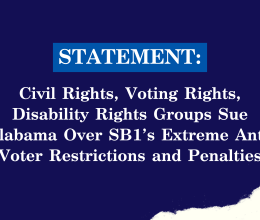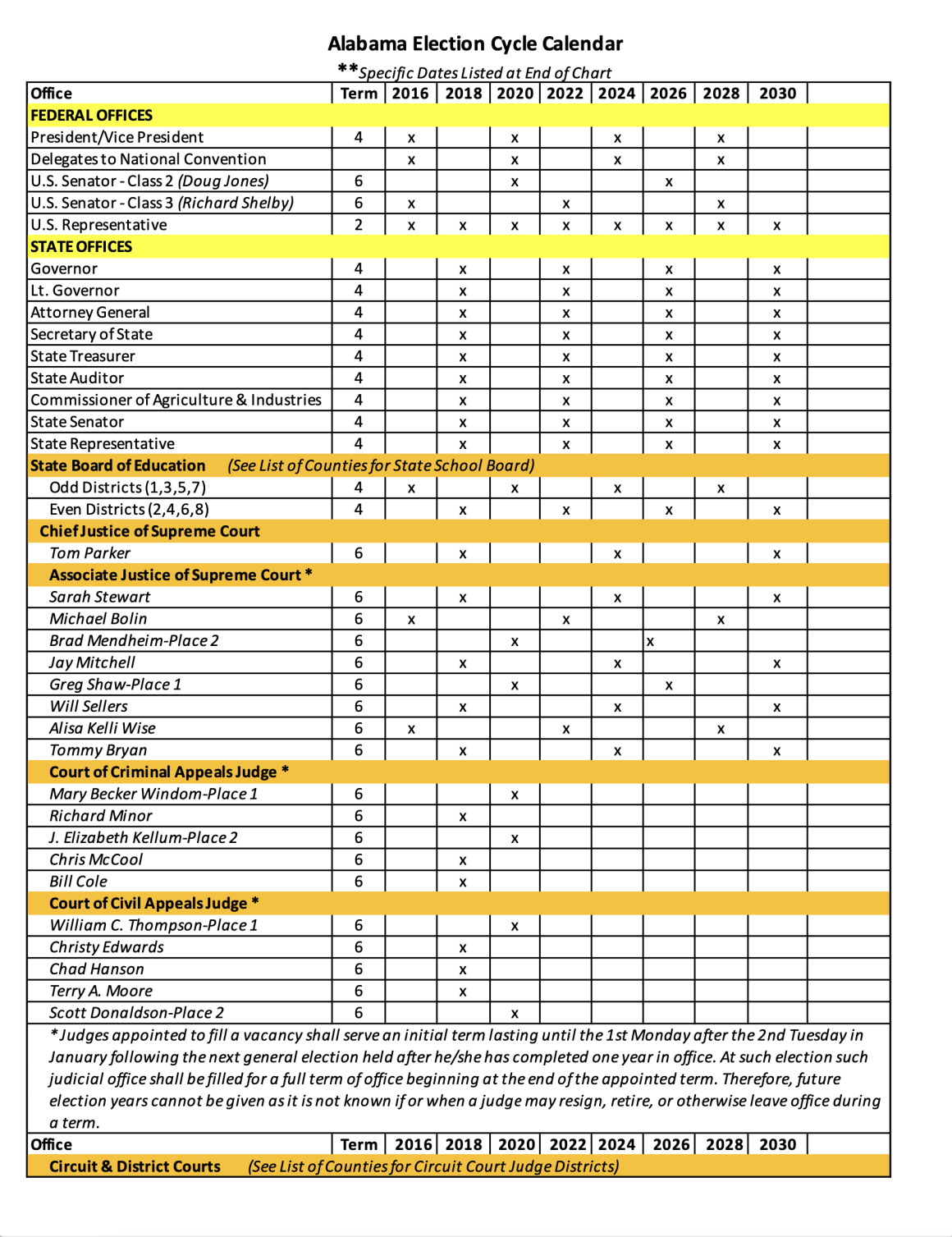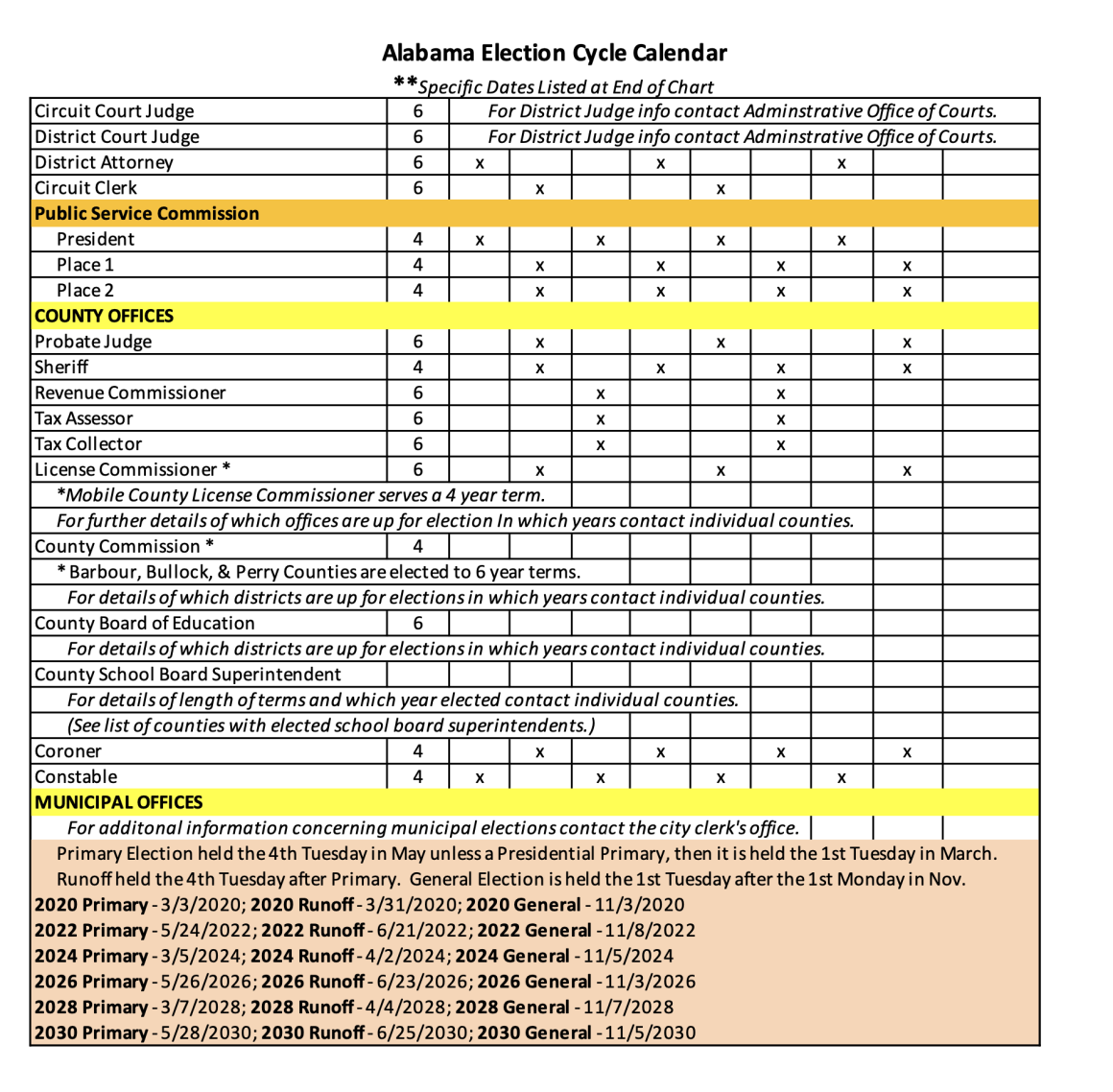
Your Guide to Elected Offices from the Local Level to Washington D.C.
What's on the Ballot in 2025
Special and Municipal Elections

This year, voters across Alabama will have a chance to cast their ballots for Mayor, City Council, and City School Board seats. And with a seat open in the legislature, voters in State Senate District 5 will also have a chance to make their voice heard at the polls this year. Here's everything you need to know about these upcoming elections.
SPECIAL ELECTION FOR STATE SENATE DISTRICT 5
-
This district includes all of Fayette, Lamar, and Walker County and portions of Tuscaloosa and Jefferson County.
-
Election timeline:
-
March 11, 2025 - Special Primary (Democratic candidates only)
-
April 8th, 2025 - Special Primary Runoff (if necissary)
-
June 24th, 2025 - Special General Election
-
ALABAMA MUNICIPAL ELECTIONS
-
Mayor, City Council, and City Boards of Education seats are on the ballot in municipal or city elections.
-
Election timeline:
-
March 4, 2025 - City of Tuscaloosa Municipal Election
-
August 5, 2025 - City of Dothan Municipal Election
-
August 26, 2025 - All Alabama Municipal Elections (excluding Tuscaloosa & Dothan)
-
WHAT DO THESE ELECTED OFFICIALS DO?
ALABAMA STATE SENATE | TERM: 4 YEARS
- While both legislative bodies (the House of Representatives and the Senate) in the Statehouse pass bills on public policy matters, set levels for state spending, raise or lower taxes, the Senate has the sole power of confirmation of certain appointees. They are also the deliberative body and able to have lengthier debates. There are 35 State Senators. Each member represents a district of approximately 137,000 Alabamians.
MAYOR | TERM: 4 YEARS
- The mayor serves as the head of the executive branch in city government. The mayor is responsible for overseeing the day-to-day operations of the municipality. They oversee municipal employees, makes sure that bills are paid on time, execute municipal contracts and, in general, perform many of the same functions as a CEO of a private corporation. In municipalities of less than 12,000 people, the mayor also presides over council meetings and serves as a member of the council. In these cities and towns, the mayor may vote on any issue before the council, introduce measures and participate in debates to the same extent as members of the council. In cities with populations of more than 12,000, the mayor is not a member of the council. However, they have a veto over any permanent action taken by the council. The council can override the veto by a two-thirds vote.
CITY COUNCIL | TERM: 4 YEARS
- The council is the legislative branch of city government. The council has authority over the finances and property of the municipality. The council establishes policies, passes ordinances, sets tax levels, determines what sorts of services the municipality will offer and has authority over all other legislative aspects of municipal government. Individual councilmembers, acting alone, have no greater power or authority than any other citizen of the municipality. The council can only act as a body at a legally convened meeting. No official action may be taken by any individual council member.
CITY BOARD OF EDUCATION
- The primary function of the school board is to oversee the education of students in the community. The board’s role is to establish a vision for the system, adopt written policies and programs, act on personnel recommendations, consider and approve operating budgets, and advocate for the needs, resources, and interests of public school students.
-
Details regarding term length and the election vs. the appointment of city school board members vary based on the local law enacted.
Guide to Your Alabama Elected Officials
The State Executive, Judicial, and Legislative Branches

STATE EXECUTIVE BRANCH
GOVERNOR
TERM: 4 YEARS
-
The head of the executive branch executes state laws, commands our Army and Air National Guards, and signs/vetos bills from the state legislature. They also declare state of emergencies, call special sessions for the state, and pardon criminal convictions.
LIEUTENANT GOVERNOR
TERM: 4 YEARS
- The second-ranking officer in the executive branch and the first in line to succeed the Governor. The lieutenant governor acts as president of the Senate and is the tie-breaking vote.
ATTORNEY GENERAL
TERM: 4 YEARS
- They defend Alabama in suits against the state. They also provide legal advice to state and county officers and advisory opinions on the constitutionality of bills as well as request execution dates for prisoners on death row. They may direct the prosecution of any criminal case in any of the courts of the state.
SECRETARY OF STATE
TERM: 4 YEARS
- The Alabama chief election official certifies vote totals, candidate qualifications, and ballots. They also maintain the state government’s official documents and public records.
STATE TREASURER
TERM: 4 YEARS
- They handle all deposits, payments, investments, and other financial dealings on behalf of the state of Alabama.
STATE AUDITOR
TERM: 4 YEARS
- They’re constitutionally required to report annually on all receipts and disbursements of every character, all claims audited and paid out, and all taxes and revenues collected into the treasury.
STATE BOARD OF EDUCATION
TERM: 4 YEARS
- The board consists of nine members who authorize education policy for Alabama and who appoint the State Superintendent.
COMMISSIONER OF AGRICULTURE
TERM: 4 YEARS
- They manage the Department of Agriculture and Industries which oversees farms, animal and plant industry, pesticides, and other agricultural products.
PUBLIC SERVICE COMMISSION
TERM: 4 YEARS
- Tasked with overseeing the regulation of public transport and utilities, this three member commission provides consumers with safe, adequate and reliable services at rates that are equitable and economical.
STATE JUDICIAL BRANCH
ALABAMA SUPREME COURT
TERM: 6 YEARS
- This nine member court is the highest court in Alabama. They are authorized to review decisions of any state court, conclude legal matters other can’t help due to lack of jurisdiction, and set official practices and procedures for all state courts.
ALABAMA SUPREME COURT, Chief Justice
TERM: 6 YEARS
- The chief justice acts as administrative head of Alabama’s judicial system but does not have additional authority or power during legal proceedings.
CRIMINAL APPEALS
TERM: 6 YEARS
- This five member court hears matters settled at circuit court level, including exclusive jurisdiction over all misdemeanors, felonies, and habeas corpus.
CIVIL APPEALS
TERM: 6 YEARS
- This five member court hears matters such as divorce, custody, worker’s compensation, and appeals from administrative agencies.
STATE LEGISLATIVE BRANCH
ALABAMA HOUSE OF REPRESENTATIVES
TERM: 4 YEARS
- While both legislative bodies pass bills on public policy matters, set levels for state spending, raise or lower taxes, the House is the only chamber that can originate revenue bills. They are also able to override a gubernatorial veto with a simple majority. There are 105 State House Representatives. Each member represents a district of approximately 40,000 people.
ALABAMA SENATE
TERM: 4 YEARS
- While both legislative bodies pass bills on public policy matters, set levels for state spending, raise or lower taxes, the Senate has the sole power of confirmation of certain appointees. They are also the deliberative body and able to have lengthier debates. There are 35 State Senators. Each member represents a district of approximately 137,000 Alabamians.
Guide to Your County Elected Officials
This list may not reflect all the county elected offices and the responsibilities across the state.

County offices are not elected on the same year in every county across the state. Be sure to refernce your county's sample ballot for the most accurate information.
PROBATE JUDGE
TERM: 6 YEARS
- Probate judes oversee judicial matters such as name changes and adoptions, public records, elections, issuing marriage licenses, and appointing notaries public.
SHERIFF
TERM: 4 YEARS
- The Sheriff is county’s chief law enforcement officer. Some counties have specific laws which govern the sheriff’s office differently. The Alabama Supreme Court holds county sheriffs as state officers thus making them immune to most legal actions.
REVENUE COMMISSIONER
TERM: 6 YEARS
- Revenue Commissioners are responsible for mapping, appraising and assessing each parcel of property and then collecting tax based upon each parcel's assessed value.
TAX ASSESSOR
TERM: 6 YEARS
- The Tax Assessor’s responisiblity is to discover, list, assess, apply exemptions, abatements, current use, and process real and personal property tax returns.
TAX COLLECTOR
TERM: 6 YEARS
- The Tax Collector is responisble for collecting, investing, and disbursing taxes. They account for the tax money or taxable property and provide budget projection services for relevant agencies.
LICENSE COMMISSINER
TERM: 6 YEARS*
*Mobile County License Commissioner serves a 4 year term
- The License Commissioner is responsible for the issuance of certain business and professional licenses, motor vehicle licenses, motor vehicle titles, temporary tags, motor vehicle and boat casual sales and use taxes, drivers' licenses, and conservation licenses.
COUNTY COMMISSION
TERM: 4 YEARS*
*Barbour, Bullock, & Perry Counties are elected to 6 year terms
- County Commissioners develop and adopt county laws on a wide variety of topics such as public health, parks, solid waste management, roads and highways, zoning and land use. One of the central roles commissioners perform in county management is overseeing the personnel system.
COUNTY BOARD OF EDUCATION
TERM: 6 YEARS*
Term may vary in some counties
- County Boards of Education govern local school systems, promote student learning, and prepare students for college and careers. They are responsible for overseeing the education of students in the community.
COUNTY SCHOOL BOARD SUPERINTENDENT
TERM: 6 YEARS
- The superintendent serves as the board's chief adviser on educational matters and as the district's educational leader.
CORONER
TERM: 4 YEARS
- The Coroner’s responsibility is to coordinate with law enforcement, the District Attorney's Office, and the Alabama Department of Forensic Sciences in determining the cause and manner of death, assist families with information regarding autopsy and toxicology results, to sign death certificates, too collect county death statistics, including motor vehicle crashes, overdoses, suicides,
Alabama Election Cycle Calendar
Alabama Elections through 2030

Related content

Milligan et al. v. Allen et al.
January 24, 2022
Civil Rights, Voting Rights, Disability Rights Groups Sue Alabama...
April 4, 2024
HB 64 – Election Day Holiday
March 4, 2025
HB 71 – Early Voting Expansion
March 4, 2025
HB 59 - Early Voting Centers
March 4, 2025
HB 60 – Alabama Voting Rights Act
February 19, 2025
Contact Your Lawmaker
February 18, 2025

